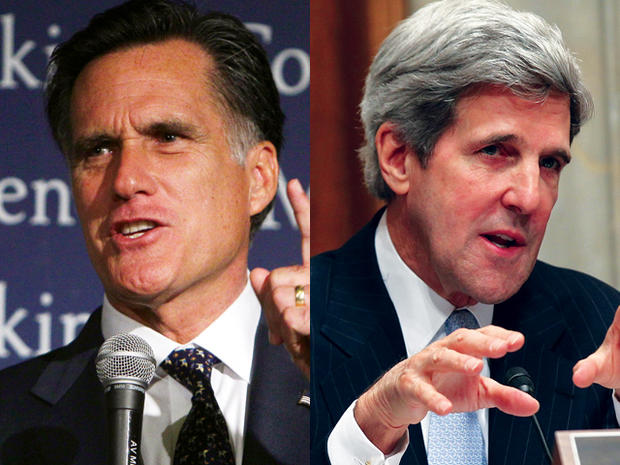Is Mitt Romney the GOP's version of John Kerry?
In 2004, the Democratic Party nominated an extremely wealthy, somewhat-awkward Massachusetts politician with great hair, strong links to the political establishment and a reputation for flip-flopping as its candidate for president.
In 2012, the Republican Party may be about to do the exact same thing.
The 2004 candidate, of course, was John Kerry, the man Democrats would ultimately - and somewhat grudgingly - tap to face George W. Bush in the general election. The reason they did so had a lot to do with the perception that Kerry was the Democrat with the best chance to win.
But Democrats took their time in nominating Kerry: They coalesced around the candidate only after flirting seriously with the candidacy of Howard Dean, an anti-establishment figure who was ultimately deemed too liberal, too undisciplined and too angry to win the White House.
Some Democrats even came to adopt the slogan "Dated Dean, Married Kerry" to illustrate that while Dean may have been exciting, Kerry was the better long-term bet. Sure, they thought, he was a bit long-winded. But he was a war hero with a long record in Congress, and, unlike Dean, he wasn't likely to scare off swing voters. Democrats knew that their base hadn't warmed to Kerry like they did Dean. But with the hated George W. Bush in office, they figured, that didn't much matter - they'd vote for whoever could win.
Fast forward to today. Now it's the Republicans who are looking for a candidate to defeat a deeply unpopular incumbent president from the opposing party. In Michele Bachmann, they have their Howard Dean figure: A candidate who can excite the base but who major donors and the establishment see as too extreme to win a general election.
And in Mitt Romney, they have their Kerry: A safe, relatively centrist establishment figure who polls suggest has the best chance of winning next November. Republicans don't necessarily like Romney all that much - he's had to endure a series of calls for a Romney alternative, from Bachmann to Rick Perry to Chris Christie - but many appear willing to grudgingly nominate him if they think it means defeating the president. That's especially true among establishment Republicans.
Still, it's important to realize that the political landscape has changed since 2004. The rise of the Tea Party movement has helped shift power away from the Republican establishment, which is focused largely on electability, and toward the conservative base, which is focused far more on ideological purity. That hurts Romney, a man viewed skeptically at best by many in the base because of his moderate views as Massachusetts governor -- not to mention his decision to sign a universal health care law in his state that has been called a model for the national health care law signed by Mr. Obama.
And Republicans surely remember how things worked out in 2004: The "electable" candidate from the other party didn't actually get elected. The same thing happened in 1996, when Bob Dole - a safe, establishment choice - couldn't defeat Bill Clinton. Indeed, one could argue that nominating the safe choice isn't really safe at all - though there is certainly a counterargument to be made, as any Democrat who remembers George McGovern's disastrous 1972 presidential run knows all too well.
Still, the similarities between Romney and Kerry are striking enough that it's easy to imagine them having nearly identical experiences: Surviving primary challenges from more charismatic and controversial rivals only to lose the general election to a polarizing - but generally more relatable and likeable - incumbent. In 2004, the Pew Research Center Poll asked whether Mr. Bush or Kerry seemed more like a "real person" - and Mr. Bush won easily, 56 percent to 38 percent. And a Zogby/Williams Identity Poll that year found that 57 percent of undecided voters would rather drink a beer with Mr. Bush than his challenger.
There aren't yet any polls on whether voters would rather have a beer with Mr. Obama or with Romney - who, technically, wouldn't actually be drinking, in accordance with his religious beliefs. But surveys have shown that while they have soured on Mr. Obama's performance on the job, many voters still like the president as a person.
If Romney reaches the general election, according to an August Politico report, the president's campaign plans to cast him as inauthentic in order to win the have-a-beer-with-him test - the same strategy Republicans used against Kerry in 2004. And Romney, a wealthy northeasterner who has changed his positions on a number of issues, is perhaps even more vulnerable to the charge than Kerry was. All this means that for the Obama campaign, a face-off against the GOP's "safe" candidate might be far more appealing than the conventional wisdom -- and the early polls-- might lead you to believe.
